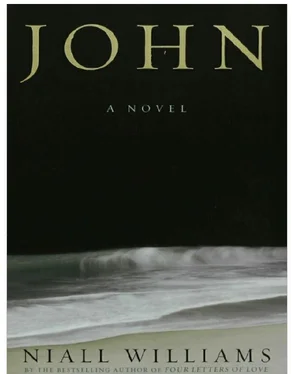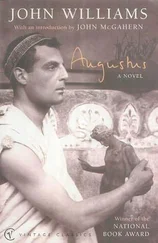But others, Auster, Linus, Baltsaros, move slightly forwards and Matthias continues: 'How does it serve to be silent? Are we not human? Is it not of man to seek to know? How can this be wrong if it makes stronger our faith? That we might better serve by knowing, surely this is truth. Is this not the truth, Master? All want to know what only you can tell us. How long more? How long more will we wait for the coming?'
'Brother,' the bald figure of Lemuel says, 'it is not for us to ask.'
'But it is. It is for us to ask and for our master to tell. How long? How long more are we to live on this barren island? I am not alone in asking how a life here, far from all, serves the Divine. I am not alone in asking, only in asking aloud. I am speaking the truth for us all. Surely there is a sign for us. Surely he has told you and you can take us from this darkness.'
At this, Matthias drops to his knees before John. He reaches out and takes the old man's hand and places it upon his own head.
'Behold, I touch the hand that touched the Christ,' he says. 'Of he that has seen. When will you guide us into the light of his presence? Master, tell us.'
'Matthias! Enough!' Ioseph steps forward, puts his hand on the other's shoulder to draw him back. But Matthias pushes it off.
'Does the Lord speak to you still, or is he silent?' he asks.
The sea sounds at the cave's entrance. All watch the old apostle's face. It is impossible to read what thoughts travel there. His mouth is tightly closed, his lips thin. As if in deep communion, or scrutiny for something precious lost, there is a deep furrow between his brows. His breath through the long, straight nose is inaudible. He has such stillness as do the dead. His long white hair falls thinly in serene compose. But within him may be thunders and lightnings. None can say.
Matthias holds his hand firmly. He will not let go until he has his answer. 'Is he silent to you?' he asks again. 'Does he speak to you?'
The slightest thing now may be a sign. There is turned on the old apostle's face such study and concentration as to note each quiver of muscle, each infinitesimal flickering of nerve, and such as may betray the truth of his response. His blind eyes are open and clear as sky. His lips press together and then — is he going to speak? The disciples dare not make a sound. Those who know they should admonish Matthias and leave do not. Those who so desperately hunger for an answer allow themselves to lean ever so slightly forwards.
John's tongue touches his lips.
Beside him, the youth Papias stands.
'I am the servant of the Lord, Jesus Christ,' he says. 'As are all of you. Because we were called. I heard the calling, and I have undertaken the Lord's work until he comes again.'
The elder disciples nod, comforted even by so few words.
But Matthias asks, 'Will he, Master? Will he come again? Will we see him with our own eyes? And when will he come? Is there a sign?'
'Matthias!' the scribe's voice calls out.
'Be calmed, Prochorus,' says John. He raises his brows as if so he might lift the weight on his spirit; his voice is quiet and firm. 'He will come again, Matthias. You will see him with your own eyes. As will I. The Lord has told me so himself.' He pauses, as if the saying aloud of this has renewed him in some way, as if he has traversed some shadowed terrain in himself into a naked light. 'He will come again,' he says simply.
'Soon, Master?'
'The hour grows near,' John answers. He withdraws his hand and holds it in the other.
The hour grows near.
The storm passed, a boat lands. It brings news of the outside world, and Papias carries this to the cave.
John sits outside on a rock, his face to the pale sun. He hears the footsteps of the youth and interprets their heaviness.
'Papias, you may tell me,' he says.
'Master, it is sad news. The boatmen say the persecution continues.'
'This is not their only news.'
'No, Master.'
'Tell me.'
'They say there was news of a new Christian martyr. He was one who had travelled, it was said, as far as the Caucasus Mountains to preach the word of the Lord, and had preached to the Scythians and from there went to Byzantium, then to Thrace and Macedonia, down the Corinthian Gulf to Patros in Greece.'
'Tell me.'
'Aigeatis, the governor of Patros, became enraged at his preaching and ordered him brought before a tribunal, where he was asked to renounce the Christian faith. But he would not.' Papias pauses. He studies his master's face, for it shows something he cannot explain. It is as though what he is telling is already known, or has to the old apostle been foretold. 'The governor Aigeatis ordered him to be crucified, Master,' he continues.
'Yes.'
'Do you know already, Master?'
'Tell me.'
'They say he was scourged and hung upon the cross, that he hung there for three days in suffering. The people came around him, and in his suffering he cried out to them to love the Lord Jesus. For three days he would not die. He was scourged further while he hung on the cross, but yet did not speak against our Lord. The boatman says his last words are reported, "Accept me, O Christ Jesus, into your eternal realm.'"
Fear and sorrow and awe pause Papias. He thinks of the agony of the martyr and his own intolerance of pain. He thinks of what it would be to have the ropes bind his arms to the cross, of the muscles tearing, and the wounds from the scourging crying out. He thinks of the thirst, and the sun burning, of the hunger and the anguish and how all such would be relieved at once if he were only to renounce. He blinks himself out of such thoughts.
'The boatman says the martyr's name. .'
'Andrew,' says John.
'Yes, Master.'
Andrew, the first. The fair-haired. Brother of Simon Peter. His father, Jona; his mother, Joanna. Andrew, who believed before I did. Who saw Jesus walking and jumped to his feet at once. That blue morning. We ran to be up with him. The first words our Lord spoke to us, 'What are you looking for?'
I, too timid to answer.
Andrew asked, 'Rabbi, where are you staying?'
'Come and see.'
How he ran back for Simon Peter, shouting, 'We have found the Messiah! We have found him!'
The beginning.
The day being dry, the old man walks out on the island with Papias. The youth gives his right arm. He does not speak unless spoken to. He believes himself honoured to be attendant on the Apostle.
The place is mostly rock, the wind cool. Sea sounds and seabird calls fill the air. They take a route up from the shore, the old man in his white robes frail and shaped thin by gently pressing wind. The youth is dark-haired and strong. White clouds cross swiftly above them, freeing and capturing the sun.
While to the others the island of their banishment has become smaller with time, to John in his blindness it has become boundless. In the dark in which he walks it is a landscape endless as eternity. He has seen it years previous, but forgotten the exactness. Now it is only the dark place where he is waiting for the light. He has Papias guide him up across the weathered rock face, past the low dwellings of the other disciples, and away on to the higher ground, where there is a view of the open sea and the island's perimeter. It is the highest point.
Whether the Apostle knows this exactly Papias is not sure. Whether he brings them there to the closest point to heaven on purpose or it is an assigned place and the Lord has communicated this to John, Papias does not enquire. In the holiness of the Apostle he believes completely. He believes all things John does are for a reason, and that this will be revealed in time. In recent months Papias has heard others in the community murmur doubt about the old man's memory and cogency. Matthias is not the only one to question. Others, too, are grown restless and impatient, the ascending columns of their prayers thinning at the base. Papias hears, but says nothing. He tells none of this to the old man, for it seems a betrayal, and his own faith is still absolute.
Читать дальше










